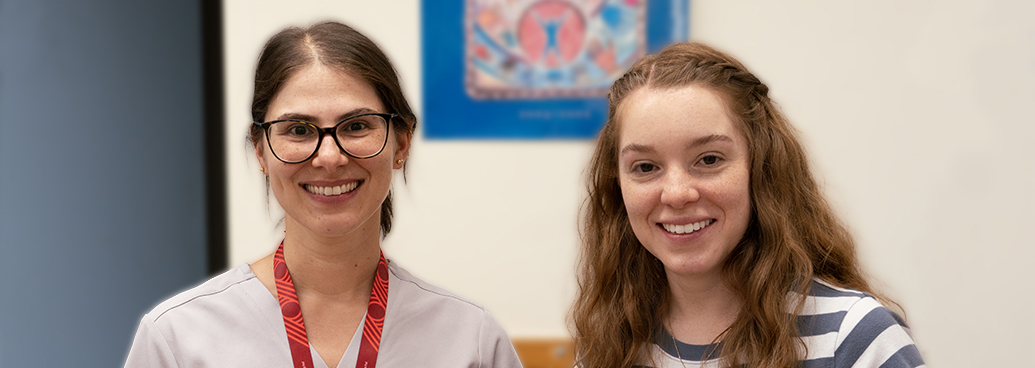A community of practice between the MUHC and the Ungava Tulattavik Health Centre
When clinical teams from the North and South connect, patients benefit. This is especially true in hand occupational therapy, where collaboration between professionals like Julie Massé, based in Kuujjuaq, and Bianca Abbate at the Montreal General Hospital helps ensure seamless continuity of care—despite the thousands of kilometres between them. Thanks to this strong partnership, Inuit patients can begin their rehabilitation in Montreal and continue it in the North, with follow-up tailored to their unique realities.
Advancing hand therapy expertise through an MUHC visit
Julie Massé, an occupational therapist at the Ungava Tulattavik Health Centre, visited Montreal in early July to deepen her expertise in hand therapy alongside her colleague Bianca Abbate from the Montreal General Hospital (MGH). This visit is part of a valuable, ongoing collaboration between the McGill University Health Centre (MUHC) and healthcare institutions in Northern Quebec.
.jpg)
Providing specialized occupational therapy in Northern Quebec
Based in Kuujjuaq, Julie covers a vast territory stretching from Kangiqsujuaq to Kangiqsualujjuaq. Many of her Inuit patients must travel to the MGH for specialized care, often following injury or surgery. Once home, they frequently need to continue rehabilitation. Julie and her team then take over to ensure a safe and lasting return to daily activities.
Ensuring continuity of care across the distance from Kuujjuaq to Montreal
Julie’s visit to Montreal enabled concrete exchanges with Bianca on best practices in hand therapy and the use of orthoses adapted to various conditions. These discussions guarantee optimal continuity of care despite the distance between facilities.
Working in Nunavik: a lifestyle between care and nature
A graduate of the University of Ottawa, Julie moved to Kuujjuaq nearly two years ago, driven by a spirit of adventure. There, she discovered a unique lifestyle in harmony with nature:
“After a shift, I’ve gone cross-country skiing under the northern lights,” she shares.

Strong human connections for care adapted to Northern realities
Julie highlights the importance of the relationships she has built with occupational therapists at the MUHC, thanks to ongoing collaboration supported by McGill RUISSS:
“Since we often follow the same patients, it’s reassuring to be able to easily communicate with colleagues in the South. We stay in regular contact by email and also connect via video calls.”
.jpg)
The role of McGill’s RUISSS in healthcare across Quebec
To ensure equitable care throughout Quebec, each medical faculty is responsible for a portion of the territory. McGill University’s faculty covers 63% of the province, including northern regions, Abitibi-Témiscamingue, Outaouais, and western Montreal.
The McGill RUISSS plays a central role: improving access to care, supporting training, and promoting research in these remote areas. Most importantly, it fosters meaningful exchanges between healthcare professionals.
A rooted community of practice better serving the North
The McGill RUISSS community of practice was not built overnight. It has grown over time, driven by experience, communication, and the unwavering commitment of teams on the ground. This network formed organically, responding to the realities of both North and South, adapting to the concrete needs of patients across specialties.
It is this gradual development that makes collaboration between Kuujjuaq and Montreal effective today. Thanks to professionals like Julie and Bianca—curious, engaged, and deeply invested—this network thrives, grows, and continues to make a real difference.

